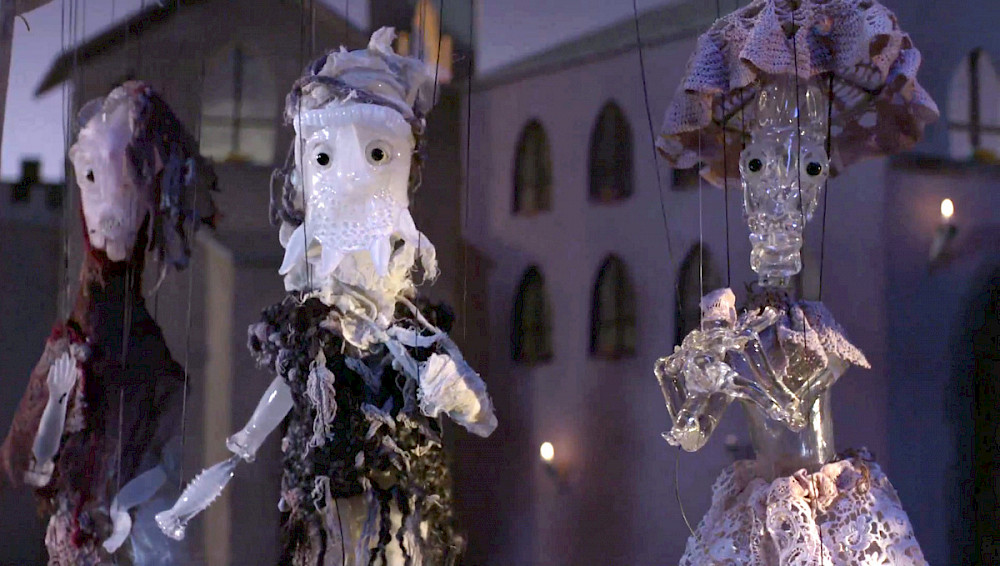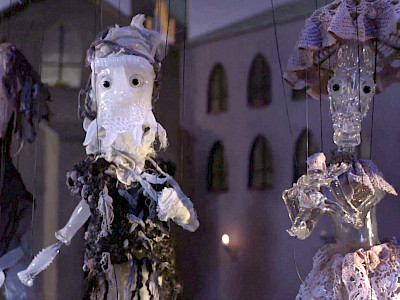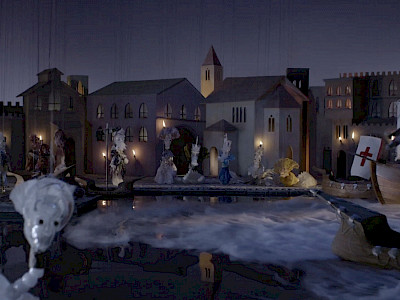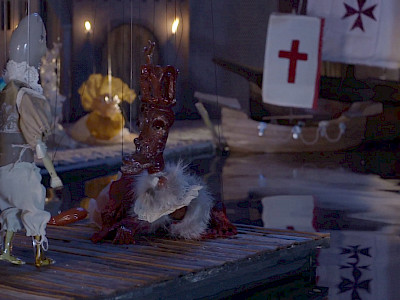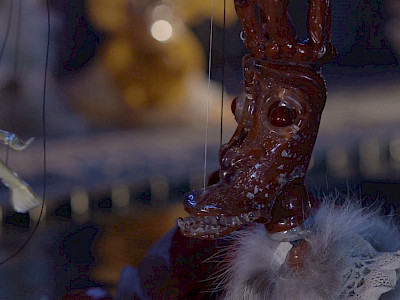06.05, 08.05.2016
Wael Shawky Alexandria
Cabaret Crusades: The Secrets of Karbala
cinema
Arabic → EN | ⧖ 2h | € 8 / € 6
Wael Shawky is an internationally lauded artist and filmmaker whose work focuses on historical turning points in Arab society. With the animated film trilogy Cabaret Crusades, the Egyptian draws a historical timeline of the Crusades from the Arabic point of view. In 2016, the Kunstenfestivaldesarts is presenting the last part of this epic trilogy. The Secrets of Karbala commences with the Battle of Karbala in 7th-century Iraq. Shawky focuses on the historical power struggle between the Shiites and Sunnis within Islam, and takes us on a journey through time to mediaeval cities like Aleppo, Damascus, and Baghdad. By re-enacting the events through hand-blown glass puppets, Shawky shows us how history as we know it is both fragile and unreal. Who is pulling the strings? Cabaret Crusades is contrived miniature theatre that makes an almost surreal drama out of historical events. A sensitive and incisive lesson in the writing of history.
Cabaret Crusades: The Secrets of Karbala
Since 2010, Wael Shawky has taken on the ambitious project of chronicling the events of the Crusades. The project, titled Cabaret Crusades, is a film cycle divided into three chapters, each describing specific horrors of these destructive religious wars, with meticulously crafted characters, music, and scenography. What is inherently unique to these videos is the visualization of the characters: Shawky employs handcrafted marionettes to tell the stories of both the aggressors and victims of medieval religious strife.
The third and final chapter, The Secrets of Karbala, describes the beginnings of the split between Muslims into Shiites and Sunnis in the battle of Karbala and later shifts to show the chasms between Orthodox and Catholic Christians during the Fourth Crusade (1202-1204). This particular film sets out to illustrate the fragility of humanity: using Murano glass, Shawky created more than 200 marionettes and statuettes, some marionettes taking the form of animals, others disfigured – all showing the grotesque brutality of war. Despite the marionettes’ lack of dramatic memory, the spectator is nonetheless taken by their vacant, yet haunting expressions.
The Battle of Karbala
The Battle of Karbala took place on Muharram 10, in the year 61 AH of the Islamic calendar (October 10, 680 AD) in Karbala, in present-day Iraq. The battle took place between a small group of supporters and relatives of Muhammad’s grandson, Husayn ibn Ali, and a larger military detachment from the forces of Yazid I, the Umayyad caliph.
When Muawiyah I died in 680, Husayn did not give allegiance to his son, Yazid I, who had been appointed as Umayyad caliph by Muawiyah, and considered this action as the breach of the Hasan-Muawiya treaty. The people of Kufa sent letters to Husayn, asking his help and pledging their allegiance to him, but they did not support him later. As Husayn travelled towards Kufa, a nearby place known as Karbala, his caravan was intercepted by Yazid I’s army. He was killed and beheaded in the Battle of Karbala by Shimr Ibn Thil-Jawshan, along with most of his family and companions, including Husayn’s six-month-old infant son, Ali al-Asghar ibn Husayn, with the women and children taken as prisoners.
The dead are regarded as martyrs by both Sunni and Shia Muslims, and the battle has a central place in Shia history and tradition, and has frequently been recounted in Shia Islamic literature. The Battle of Karbala is commemorated during an annual 10-day period held every Muharram by Shia, and Alevi culminating on its tenth day, known as the Day of Ashura. Shia Muslims commemorate these events by mourning, holding public processions, organizing majlis, striking the chest and in some cases self-flagellation. Forty days after Ashurah, Shias mourn the death of Hussein ibn Ali in a commemoration called Arba’een.
A film by
Wael Shawky
Voices
Aida Fahmy, Mahmoud Masaoud, Khaled al-Zahaby, Adel Khalaf, Amed Khalil, Tarek Ismail, Jehad Abo al-Enein
Supervised by
Ibrahim Baalousha
Sound technician
Mahmoud Shaaban, Hakim Studio
Production managers
Ahmed Zayan, Fig Leaf Studio
Presentation
Kunstenfestivaldesarts, Les Brigittines
Production
Qatar Museums Authority (QMA), Kunstsammlung Nordrhein-Westfalen
With the support of
Kulturstiftung des Bundes
Postproduction with the support of
Film und Medien Stiftung NRW
Sponsored by
Venetia Studium
